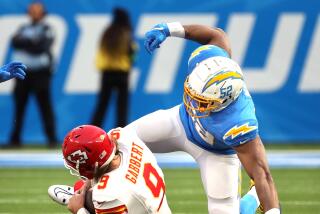New Chief Vows to Put Spark Back in Chrysler
AUBURN HILLS, Mich. — Faced with staggering losses and employees’ plummeting morale, Chief Executive Dieter Zetsche pledged Tuesday to turn Chrysler back into “a lean and mean” company that makes good money and is brimming with exciting cars and trucks.
Zetsche, the first German to head the Chrysler side of DaimlerChrysler’s business, said his top priority is to return to profitability by slashing costs and becoming more nimble.
“I like to see ourselves as dolphins among the whales and sharks,” he said in his first meeting with the media since being named chief executive last month of the ChryslerGroup.
“I want to be fast and smart, and on the other side I want to be something positive,” he said at DaimlerChrysler’s North American headquarters in this suburb north of Detroit. “It means we have great products that are exciting and that people are striving for.”
Zetsche’s comments came a day after DaimlerChrysler Chairman Juergen Schrempp told shareholders in a letter that the Chrysler division, which once boasted the highest profit per vehicle in the industry, would post a loss of about $1.2 billion in the fourth quarter alone.
That’s on top of $512 million in red ink recorded in the third quarter in the wake of widespread discounts to boost sluggish sales of a new series of minivans and slow-selling pickup trucks and sport-utility vehicles.
Although the Chrysler Group is expected to make a profit this year, industry analysts expect it to post an overall loss in 2001.
The third-quarter performance was behind Schrempp’s dismissal last month of James Holden, who had been president of Chrysler Group for less than a year, and the installation of Zetsche. His appointment was seen alternatively as the final nail in Chrysler’s coffin of independence--more than a dozen top American executives have resigned or been fired since Daimler-Benz acquired Chrysler Corp. two years ago--or as the true beginning of Chrysler’s rebirth under its German ownership.
Zetsche, a 47-year-old engineer with a bushy walrus mustache and a taste for John Irving novels and blues music, tried to paint a picture of the latter scenario.
He said he has initiated a restructuring plan covering management of material, plant and fixed costs and general operations, overseen by newly appointed Chief Operating Officer Wolfgang Bernhard, and revenue management and product strategy overseen by himself. A progress report is due in February when DaimlerChrysler releases 2000 earnings.
Streamlining Chrysler’s cost culture could come through component sharing among the Chrysler and Mercedes-Benz brands in areas such as automatic transmissions and axles.
Although Zetsche acknowledged that the company wants to avoid diluting the Mercedes brand with Chrysler parts, “nobody is interested if we use the same batteries,” he said.
Zetsche took pains to dispel rumors swirling around Detroit, saying it was nonsense that he would bring in 12, 25 or 100 Germans to replace Chrysler’s top management wholesale.
“We have a great team here,” he said. There may be areas of the company that can be strengthened by looking outside Chrysler, including to Germany, he said, “but there is no master plan.”
He also refuted published reports that he would drastically cut back incentives, the discounts that nudge along sales of slow-moving models.
“I’m not entirely stupid,” he said. “You might have influence over the rules long-term, but you don’t just break the rules.”
DaimlerChrysler’s share price has plummeted, losing $1.22 Tuesday to close at $41.14 on the New York Stock Exchange. That’s above an all-time low of $37.75 on Nov. 30 but well below a 52-week high of $78.68 in January.
John Casesa, Merrill Lynch’s senior automotive analyst in New York, said the bad news is not just in the stock.
Beyond Chrysler, the financing arm Debis Financial Services “will face further residual value losses, heavy trucks will be weak in the U.S., and the Mitsubishi Motors stake will continue to bleed DCX,” Casesa said in a research report Monday, referring to DaimlerChrysler’s 34% stake in the troubled Japanese auto maker.
Zetsche acknowledged that Daimler executives “didn’t expect the magnitude of the problems” when the company stunned the automotive world by announcing the “merger of equals” in May 1998, “but all of this does not question all the basic reasons that led to this strategic joining of forces.”
Chrysler employees have flooded area headhunters with resumes, and the gloom has led some in Detroit to refer to Volkswagen, whose North American headquarters are also in Auburn Hills, as “the good Germans.”
“If people wouldn’t feel sad about the situation we’re in, something would be wrong,” Zetsche said. “So I have a strong understanding that morale is affected by the situation we’re in. The question is whether you get depressed and sit in a corner crying, or if you get a different attitude, fight back, get back on track and do what it takes.”
(BEGIN TEXT OF INFOBOX / INFOGRAPHIC)
Honeymoon Is Over
The 1998 “marriage of equals” that created DaimlerChrysler has entered a rocky phase. New Chrysler Chief Executive Dieter Zetsche, right, was brought in to reduce a sudden profit slide on the U.S. side of the company. Operating earnings, in billions of dollars:
*
Chrysler
2001 (estimated): -$1.8 billion
*
Mercedes-Benz
2001 (estimated): $3.0 billion
*
*Estimated
Note: Figures based on Tuesday exchange rate of 89.3 cents to the euro.
Sources: DaimlerChrysler, Merrill Lynch






